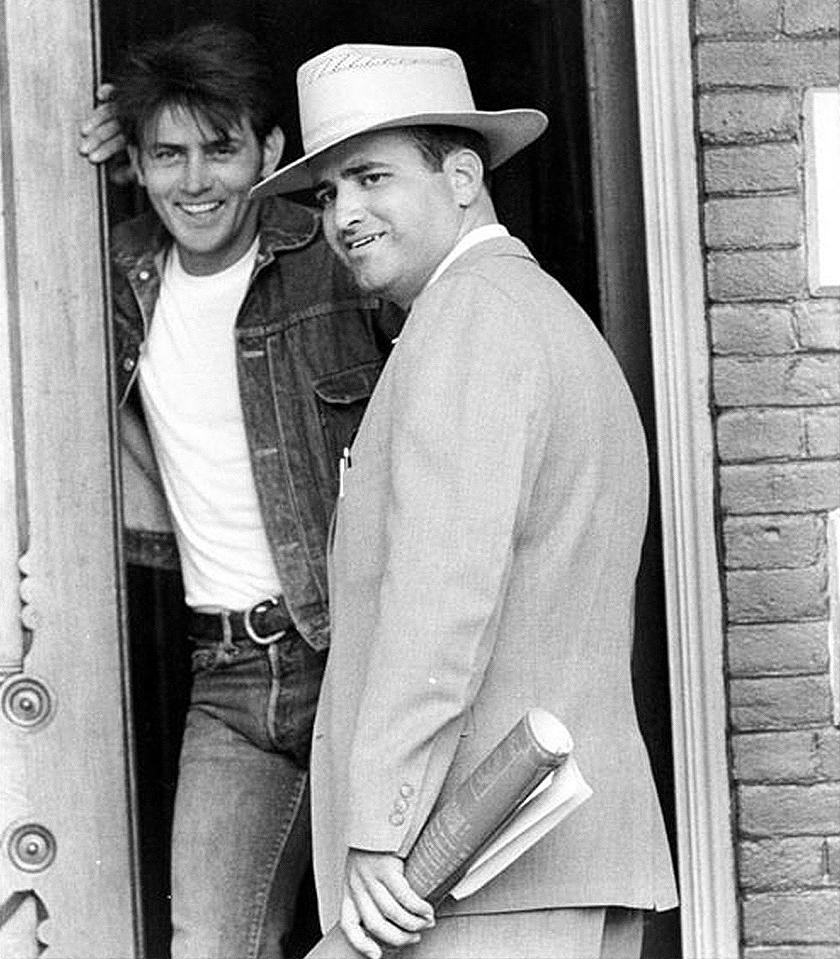Grant Tinker, TV Producer And Network Boss, Dies At 90
Television executive Grant Tinker holds up his 1979 Hall of Fame award alongside his ex-wife Mary Tyler Moore at the Academy of Television Arts & Sciences’ 13th Annual Hall of Fame induction ceremonies in Los Angeles. Tinker, who brought The Mary Tyler Moore Show and other hits to the screen as a producer and a network boss, died on Monday. Chris Pizzello/AP hide caption
toggle caption
Chris Pizzello/AP
Grant Tinker, who brought new polish to the TV world and beloved shows including Hill Street Blues to the audience as both a producer and a network boss, has died. He was 90.
Tinker died Monday at his Los Angeles home, according to his son, producer Mark Tinker.
Though he had three tours of duty with NBC, the last as its chairman, Tinker was perhaps best-known as the nurturing hand at MTM Enterprises, the production company he founded in 1970 and ran for a decade.
Nothing less than a creative salon, MTM scored with some of TV’s most respected and best-loved programs, including Lou Grant, Rhoda, The Bob Newhart Show and, of course, the series that starred his business partner and then-wife, Mary Tyler Moore.
“I am deeply saddened to learn that my former husband and professional mentor Grant Tinker has passed away,” Moore said in a statement. “Grant was a brilliant, driven executive who uniquely understood that the secret to great TV content was freedom for its creators and performing artists. This was manifest in his ‘first be best and then be first’ approach.”
Tinker summed it up with typical self-effacement in a 1994 interview with The Associated Press: “I just had the good luck to be around people who did the kind of work that the audience appreciates. The success just rubbed off on me.”
In 1981, Tinker flourished with that low-key approach in a last-ditch effort to save NBC, which was scraping bottom with its earnings, ratings, programs and morale. Five years later, when Tinker left to return to independent production, the network was flush thanks to hits such as The Cosby Show and Hill Street Blues.
Tinker, who had come to NBC as a management trainee in 1949 with legendary founder David Sarnoff still in charge, left the company for the last time at the end of an era, as NBC, along with its parent RCA, was about to be swallowed by General Electric.
In 2005, he won a prestigious Peabody Award honoring his overall career. In receiving his medallion, he called himself “a guy of no distinct or specific skills (who) always needed a lot of help.” He also had received the Governors Award from the Academy of Television Arts & Sciences.
“Grant Tinker was a great man who made an indelible mark on NBC and the history of television that continues to this day,” said Steve Burke, CEO of NBCUniversal, sole owner of the network since 2013. “He loved creative people and protected them, while still expertly managing the business. Very few people have been able to achieve such a balance.”
“His level of class set him apart from everyone else in our business,” said Bob Greenblatt, Chairman of NBC Entertainment, “and all of us at this company owe him a debt of gratitude. In fact, TV watchers everywhere do.”
Bob Newhart said in a statement that MTM created “this magical place where creativity and individuality (were nurtured). I was one of the people who was lucky enough to enjoy that freedom for 14 years on television.”
He “set the bar high both as a television executive and as a father,” said Mark Tinker. “I’m proud to be his son, and especially proud of the legacy he leaves behind in business and as a gentleman.”
Born in 1926, the son of a lumber supplier, Tinker had grown up in Stamford, Connecticut, and graduated from Dartmouth College before his first short stint at NBC.
Then he moved into advertising. At a time when ad agencies were heavily responsible for crafting programs its clients would sponsor, Tinker was a vice president at the Benton & Bowles agency when he helped develop The Dick Van Dyke Show for Procter & Gamble. There he met, and fell for, the young actress the whole country was about to fall in love with: Mary Tyler Moore.
Soon after the new CBS sitcom had begun its five-season run in fall 1961, Tinker returned to NBC, this time as vice president of West Coast programming.
Meanwhile, he and Moore became TV’s golden couple and, in 1962, they wed. (His first marriage had ended in divorce.)
Tinker stayed at NBC until 1967, after which he had brief stays at Universal and Twentieth Century Fox.
Then, with an itch to run his own shop, Tinker founded MTM and began developing its first series: a comedy to revive the flagging career of his wife.
The pilot for The Mary Tyler Moore Show rated poorly with test audiences. The heroine was dismissed for being over 30 and unmarried. Neighbor Phyllis (Cloris Leachman) was deemed too annoying, best friend Rhoda (Valerie Harper) “too New Yorky and brassy (read: Jewish),” as Tinker wrote in his 1994 memoir, Tinker in Television.
But the show, which premiered on CBS in fall 1970, was a critical and popular smash for seven seasons and became the flagship series of a studio whose mewing kitten (parodying the MGM lion) came to signify some of TV’s best.
Along the way, MTM became an incubator for some of TV’s best writers and producers, many of whom — like Steven Bochco, James L. Brooks and Tom Fontana — continue to excel in TV and films.
By 1981, Tinker’s stewardship of MTM had ended (as had his marriage to Moore) when he returned to NBC, where, he recalled in his book, “the company had lost its credibility with every important constituency — affiliates, advertisers, the press, the general public and its own employees.”
Under Tinker’s regime, NBC enjoyed a remarkable recovery. The Cosby Show was an overnight hit, but thanks to Tinker, slow starters such as Hill Street Blues (which was from MTM), Family Ties and Cheers were allowed to find their audience and became hits, too.
“Our practice was to make a judgment about a show,” Tinker recalled, “and, if we deemed it worthwhile, to really stay with it until it succeeded.”
Tinker left NBC in 1986, shortly after the announcement of its purchase by G.E.
He formed another independent studio, GTG Entertainment, in partnership with Gannett Newspaper Corporation, but its few series flopped and the company was dissolved.
Later, in somewhat of a reluctant retirement, Tinker spoke out against much of what he was seeing on television, particularly “reality” fare.
“These guys used to be corporate good citizens,” he told The AP in 2003, referring to TV programmers, “and I don’t see how they can close their eyes and turn their backs on things that air on their networks.”
Tinker is survived by his wife, Brooke Knapp, sons Michael, Mark (an executive producer of NBC’s Chicago P.D.) and writer-producer John, and daughter Jodie DiLella.




